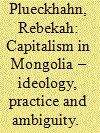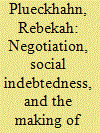| Srl | Item |
| 1 |
ID:
160840


|
|
|
|
|
| Summary/Abstract |
Definitions of and understandings of capitalism are currently the source of much debate in Mongolia’s recent context of severe economic decline. This has followed the differing and sometimes contradictory perceptions of capitalism that have emerged throughout both Mongolia’s recent capitalist history and experiences of socialism. Following an anthropological, generative approach to the making of capitalist economy and drawing from Çalişkan and Callon’s discussion of economization, we explore how the economization of everyday life in Mongolia since 1990 has given rise to a context in which the economy is intensely politicized. This special issue explores the kinds of new economic practices, social formations, ideologies and subjectivities that Mongolia’s capitalist economic forms have produced. We ask what Mongolian processes of economization can tell us about the formation of capitalist economies more generally.
|
|
|
|
|
|
|
|
|
|
|
|
|
|
|
|
| 2 |
ID:
160847


|
|
|
|
|
| Summary/Abstract |
This article explores the types of actions that are dramatically shaping the formation of the peri-urban economic landscape of the ger areas in Ulaanbaatar, Mongolia. Drawing from numerous interviews and ethnographic fieldwork in and around a bus stop on the northern edge of the city, we trace the experience of two different women who each carve out a life and livelihood on this urban fringe. Examining the types of strategies they employ to secure land and employment, we argue that negotiations, speculation and enactions of relationships are vastly influential in shaping Ulaanbaatar’s urban economy from the ground up. Drawing from the anthropology of generative capitalism and the fungibility and heterogeneous nature of money, we discuss how the making of capitalist urban economies in Ulaanbaatar implicates a variety of decisions and materials, perceptions of the state, and local economies of exchange and reciprocity. Central to the shaping of these urban economies, we argue, are emerging moral quandaries and ethics arising out of these entanglements.
|
|
|
|
|
|
|
|
|
|
|
|
|
|
|
|